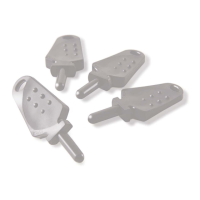SAM
®
RF Operations Manual 136
Section 5: Keys
© SAFLOK WL 12/20/2007
5.24 Replacing Lost Resident Keys
Note: Replacing lost Resident keys is discussed in this section. Replacing lost Master keys and Zone
keys (Staff keys) is discussed in Sections 5.11 and 5.12.
One of the tasks you will perform most often with the SAM RF System is replacing keys lost by either staff
or residents. When keys are lost, there are two ways to ensure the security of the property.
First, you may choose to create a new key for each resident. Refer to Section 5.21 to create a new
Resident key for each resident and use the keys in the lock immediately.
Alternately, you will need to create replacement keys and visit the lock to inhibit the lost key as discussed
in this section.
Note: When there is only one resident in a unit, replacing that person’s key is a fairly simple process.
Simply create a new key for the resident, and once the key is used in the lock(s), it will invalidate the lost
key. However, when several people reside in a unit, a key assigned specifically to one of the residents
may end up being used by another. When replacing a lost key in the case of multiple residents, it is
critical that you determine which key is actually lost.
The best way to determine exactly which key is lost is to have all the other residents of that unit bring their
keys to the office so that you can read each key using the electronic key encoder. This will provide
information as to each key’s ID and to whom it is assigned.
Reading Resident Keys
1. Be sure that the PC is turned on, the electronic key encoder device is plugged in an electrical outlet
and the USB cable between them is properly attached (see Section 2.5 “Installing the Electronic Key
Encoder and Utility Device”).
Note: The utility device need not be in the electronic key encoder to create keys.
2. Click on the Keys menu at the top of
the window or the Keys icon.
3. Point to Create, then select Read.
Note: If a key is not currently in the
electronic key encoder, you will be
prompted to insert a key into the
electronic key encoder now. You must
keep all the USB cable connected
between the electronic key encoder base
and the PC while the key image spins on
the PC screen.

